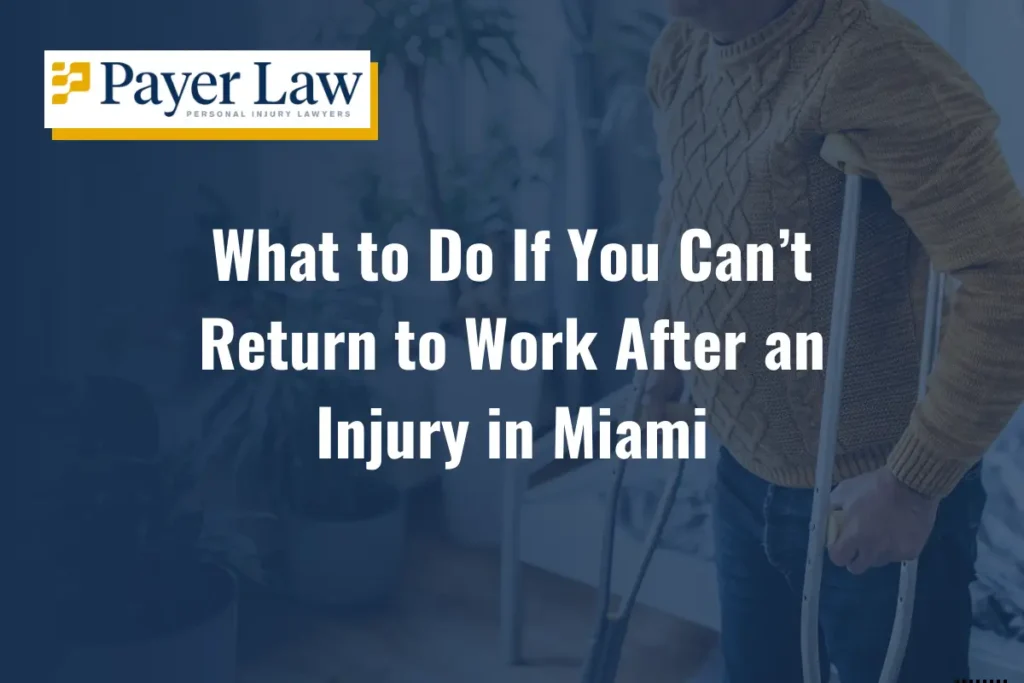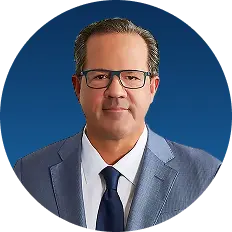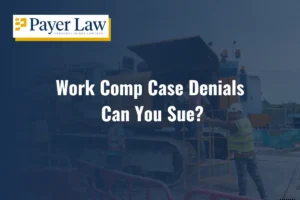How Workers’ Compensation Applies in Miami When You Can’t Return to Work
Being injured at work can be life-changing, especially if it means you can’t return to your previous career. If you were temporarily or permanently disabled from an accident at work, benefits are available to you. If you can’t return to work after being injured, you could receive benefits for temporary or permanent disability.
Work restrictions, given by a doctor, dictate what you can and can’t do on the job because of your injury. You must follow work restrictions after recovering from an injury or illness, or you could lose eligibility for benefits.
These potential workers’ compensation benefits represent a portion of what you would have earned if you could have done your full day of work. If your injury has left you permanently disabled, a portion of your average weekly wages will be paid to you. Permanent total disability benefits generally stop when you reach age 75, unless you are not eligible for Social Security benefits. In that case, benefits may continue beyond age 75.
If you are injured at work, you must report it to your employer within 30 days of the incident. Florida has strict deadlines for reporting work-related injuries and filing workers’ compensation claims. Missing these deadlines could result in losing the ability to make a claim.
An injury at work can bring serious health challenges and fear about your income. If you or a loved one can’t return to work after an accident in Miami, our experienced Miami workers’ compensation lawyer, James D. Payer, can help. With over 30 years of dedicated experience representing injured workers in Miami and South Florida, our legal team is here to stand by you and protect your rights while navigating your claim.
What Types of Benefits Can You Receive if You Can’t Return To Work?
- These benefits are provided due to an injury or illness that temporarily prevents you from returning to work.
- When hurt, you should receive funds for about 66 percent of your regular wages. Some injuries can provide about 80 percent of your wages.
- You will not receive temporary disability benefits for the first seven days of disability, unless you are disabled for more than 21 days from the work-related injury.
- You could be eligible for Temporary Partial Disability Benefits if your doctor allows you to return to work with restrictions and you earn less than 80 percent of your wages before your accident.
- These benefits apply if your injury causes permanent and total disability as defined by law. If your injuries are so severe that, after reaching maximum medical improvement (MMI), you’re permanently unable to work, you may qualify for permanent total disability benefits.
How Long Do Workers’ Comp Benefits Last for Miami Workers?
The maximum length of time you can receive temporary total or temporary partial disability benefits in Florida is 260 weeks (five years) or until you reach MMI, whichever comes first.
Depending on the circumstances, PTD benefits may continue for life or until you reach age 75. Workers who suffer catastrophic injuries or who are unable to return to any type of employment may qualify for PTD benefits.
These benefits provide wage replacement, but workers’ compensation may also continue to cover medical treatment. After you reach maximum medical improvement (MMI), you will be responsible for a $10 co-payment for each doctor visit. If you later settle your medical benefits but still require treatment, you will be responsible for covering those costs yourself.
Our Miami workers’ compensation lawyer will give your case the attention it needs if you or a loved one can’t return to work after an accident in Miami. Our team is here to protect your rights and support your claim, so you receive the benefits you need to recover.
What If Your Employer Refuses To Let You Return To Work?
Although an employer cannot legally fire you in retaliation for filing a workers’ compensation claim, Florida’s workers’ compensation law does not guarantee job protection. If you are physically unable to perform your job duties, your employer may lawfully reassign you, reduce your hours, lower your pay, or even terminate your employment.
According to Disability Rights Florida, employers are required to provide reasonable accommodations. A reasonable accommodation is any change to the position, the way the job is done, or the work environment that allows a qualified person with a disability to perform the job’s essential tasks.
The Family Medical Leave Act (FMLA) is a federal statute allowing employees to take up to 12 weeks of unpaid leave for personal or family-related medical issues. During this period, the employee cannot be fired by their employer.
Because workers’ compensation does not provide job protection, some employers require their injured employees to apply for coverage under the FMLA to protect their positions.
You can also utilize reemployment services if you can’t return to your previous job after an injury. These services help employees find work outside of their usual career. These services include vocational counseling, job-seeking skills training, resume writing, job placement, a vocational evaluation, and training and education.
Do Employers Have To Offer Light Duty or Accommodations in Miami?
Under workers’ compensation in Florida, your doctor is the only one who can place, keep you, or release you from a no-work order after an injury.
While your doctor can clear you for light-duty work, only your employer can determine if such work is available. The employer’s insurer will only accept your employer’s opinion on whether light work is available, and they must notify the insurance company about this.
In a similar situation, a Miami construction worker who is released to light duty for two weeks may normally perform heavy lifting. During this period, the employer could reassign the worker to tasks such as inspections rather than their usual, more physically demanding duties.
If you are cleared to return to work, the law requires you to make a genuine effort to do so. Refusing or failing to return could result in losing eligibility for lost wage benefits.
What If You Can’t Do Any Work at All After an Injury?
If you cannot work after an injury, you may be eligible for permanent total disability.
According to Florida’s workers’ compensation law, “in order to obtain permanent total disability benefits, the employee must establish that cannot engage in sedentary employment, within a 50-mile radius of the employee’s residence, due to their physical limitation,” or received a catastrophic injury, are eligible for permanent total disability.
In Florida, an injured employee is permanently and totally disabled if they have catastrophic injuries such as:
- Spinal cord injuries with severe paralysis
- Amputations and losing the use of an appendage
- Severe brain injuries
- Second- or third-degree burns of 25 percent or more of the total body surface
- Third-degree burns of 5 percent or more to the face and hands
- Total blindness or industrial blindness
If you’re permanently injured, you could also be eligible for Social Security Disability Insurance benefits if you’ve worked jobs covered by Social Security and have a medical condition meeting their disability definition.
To have a qualifying disability under Social Security, you:
- Cannot do the work effectively because of your medical condition.
- Cannot do the work you did previously or other work because of your medical condition.
- Have a condition that lasted or is expected to last for at least 1 year (12 consecutive months) or to result in death.
These benefits are available for people who can’t work for a year or more because of a disability. Usually, there is a five-month waiting period and your first benefit will be paid in the sixth full month after the date your disability began.
Benefits typically continue until you can work again regularly.
What To Do If Your Employer Ignores Your Work Restrictions
If you’re returning to work under restrictions and your employer insists you work to your regular capacity, or ignores your work restrictions, you can protect yourself.
Do not leave work. Stay there and contact your employer’s workers’ compensation insurance provider. Also, contact the insurance adjuster handling your claim and inform them of the situation.
If your employer sends you home, first make sure your employer has agreed to inform their workers’ compensation insurance provider that they do not have light or restricted duty. If they do not notify insurance, your benefit payments may be interrupted.
You could also contact your medical care provider to see if you can get further documentation of your limited work status or if your status can change.
If you feel like your work restrictions after a workplace injury are being ignored, Payer Law can step in. Our team can help ensure your employer complies, rather than you defending yourself alone.
When To Contact a Miami Workers’ Compensation Lawyer
The most effective way to handle workers’ compensation claims is to hire a skilled attorney for representation. If you’re concerned about employer retaliation or disputes over returning to work, consider hiring legal counsel to help protect you so you can start recovering.
Depending on your workplace injury circumstances, you can file a claim for workers’ compensation benefits, a personal injury lawsuit, or both. An attorney advocating for you and your benefits after an injury significantly increases your chances of a successful claim.
After your injury, focus on your physical and emotional health while Payer Law’s experienced attorney James D. Payer handles your fight for compensation. Our Miami team has dealt with many insurance companies that have wrongly denied claims, and we will do all we can to get you your benefits.
Contact Payer Law today for a free consultation with our workers’ compensation attorney or call 305-363-7099.





